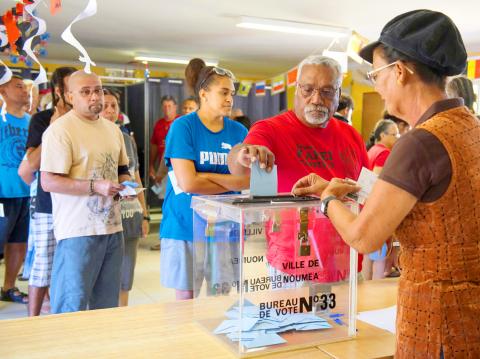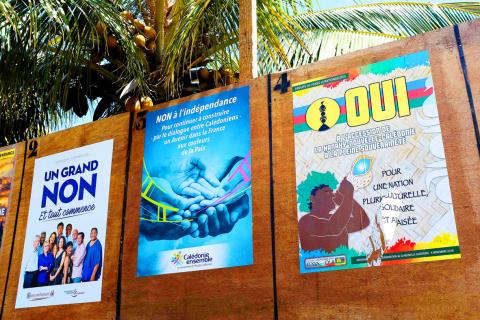The Pacific islands of New Caledonia yesterday voted to remain part of France in an independence referendum that showed support for Paris in one of its many far-flung but strategic outposts.
New Caledonia is home to a quarter of the world’s known supplies of nickel — a vital electronics component — and is a foothold for France in the Pacific where China is increasing its influence.
On the final count, 56.4 percent of voters rejected the proposition that New Caledonia become independent, a clear, but smaller-than-expected victory for loyalists.

Photo: AP
French President Emmanuel Macron expressed his “immense pride that we have taken this historic step together” in a televised address to the nation, adding that it was “a sign of confidence in the French republic, in its future and its values.”
Turnout was high for the vote, at more than 80 percent, but there are fears the referendum could inflame tensions between indigenous Kanak people, who tend to favor independence, and the white population, which has settled since France annexed the islands in 1853.
Several cars were burned and a couple of incidents of stone-throwing were reported late yesterday, local authorities said, but the vote was otherwise peaceful.

Photo: AFP
Tensions in New Caledonia boiled over into ethnic strife in the 1980s, which claimed more than 70 lives. It led to the 1998 Noumea Accord, which paved the way for a steady devolution of powers, as well as yesterday’s referendum and possibly two others before 2022.
“The Kanaks have become aware that they need to show their determination to be free at last,” Alosio Sako, head of the pro-independence movement FLNKS, said after the results were announced.
Polls had forecast a bigger victory — of 63 to 75 percent — for the “no” campaign.
“We’re a short step away from victory and there are still two votes to come,” Sako added, referring to the other two referendums possible under the accord.
Macron had largely stayed clear of the campaign in New Caledonia, but during a visit to Noumea in May, he said that “France would be less beautiful” without the territory.
He also raised concerns over increasing Chinese influence in the Pacific, saying Beijing was “building its hegemony step by step” in the Pacific — suggesting that an independent New Caledonia could be Beijing’s next target.

OPTIMISTIC: The DGBAS sharply upgraded its GDP growth estimate from 3.54 percent to 7.71 percent after the Taiwan-US trade agreement signing and given AI optimism The US imported more from Taiwan than China for the first time in decades, as US President Donald Trump’s tariffs reshape trade flows while a global boom in artificial intelligence (AI) fuels demand for tech products. US purchases of goods from China plunged almost 44 percent in December last year from 2024 to US$21.1 billion, US Department of Commerce data showed on Thursday. By contrast, shipments from Taiwan more than doubled during the same period to US$24.7 billion. The soaring Taiwanese shipments to the US reflect the huge expansion in supplies of chips and servers for AI companies, which has completely changed

The Central Election Commission has amended election and recall regulations to require elected office candidates to provide proof that they have no Chinese citizenship, a Cabinet report said. The commission on Oct. 29 last year revised the Measures for the Permission of Family-based Residence, Long-term Residence and Settlement of People from the Mainland Area in the Taiwan Area (大陸地區人民在台灣地區依親居留長期居留或定居許可辦法), the Executive Yuan said in a report it submitted to the legislature for review. The revision requires Chinese citizens applying for permanent residency to submit notarial documents showing that they have lost their Chinese household record and have renounced — or have never

US and Chinese fighter jets briefly faced off above waters near the Korean Peninsula this week, Yonhap News agency reported, marking a rare confrontation in that area between the two superpowers. About 10 US fighter jets on Wednesday departed an airbase in Pyeongtaek, South Korea, for drills above international waters off South Korea’s western coast, the news outlet cited unidentified military sources as saying. While the US planes did not enter China’s air defense identification zone, Beijing scrambled planes as they neared that region, the report said. “The Chinese People’s Liberation Army organized naval and air forces to monitor and effectively respond

Taiwan has secured another breakthrough in fruit exports, with jujubes, dragon fruit and lychees approved for shipment to the EU, the Ministry of Agriculture said yesterday. The Animal and Plant Health Inspection Agency on Thursday received formal notification of the approval from the EU, the ministry said, adding that the decision was expected to expand Taiwanese fruit producers’ access to high-end European markets. Taiwan exported 126 tonnes of lychees last year, valued at US$1.48 million, with Japan accounting for 102 tonnes. Other export destinations included New Zealand, Hong Kong, the US and Australia, ministry data showed. Jujube exports totaled 103 tonnes, valued at